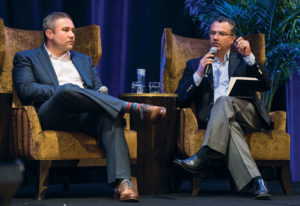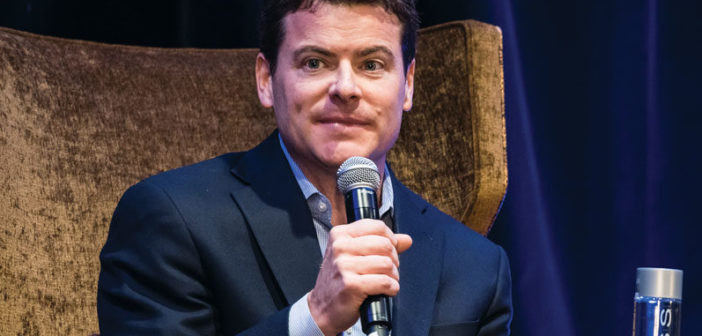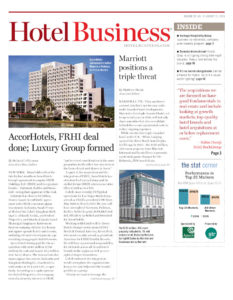WASHINGTON, DC—Are you focused on your top line when it comes to revenue optimization? That could be a big mistake.
At least, that was the opinion of several experts at last month’s Revenue Strategy Summit, held here at the Renaissance Washington, DC Downtown. They all agreed that profitability is a metric that needs more focus.
“Hotels are focused on those channel distribution metrics we’ve all been working on. What that comes down to is not just the revenue but the cost of that revenue: that profitability really is the key,” said Drew Pinto, VP, distribution strategy, systems & intermediary channels, Marriott International. “This industry is all top-line focused, so it’s easy for any company to be channel agnostic. You just want that business.”
However, said Pinto, there’s a sea change coming. “I encourage all hotels to be focused on the profitability and net revenue, and look at things that are even more sophisticated like displacement. What’s your hierarchy of channels from a profitability standpoint and what do you want to replace with other business?” he said. “It’s not just this channel good, this channel bad; it’s a lot more nuanced. We’re getting much more focused on customer segments and the best way to serve them. Distribution and channels are critical but if you don’t have good product and service, distribution becomes very hard.”
Ash Kapur, SVP and chief revenue officer of hospitality, Starwood Capital Group, agreed about the need for change. “It’s about internalizing the fact that it’s not just the top line that matters. It’s profitability that keeps the doors open,” he said, noting that the industry is shortsighted when it comes to data. “We’re looking at certain metrics but the application of that data is missing. What does this channel mix tell me? What does this segment mix tell me?” He added that the industry is so focused on OTAs, sometimes to its detriment. “There are segments that are far more expensive than an OTA. Because some of us have a myopic lens, we will ignore that fact,” he said.
Larry Kaminsky, EVP, Fulcrum Hospitality LLC, echoed the call for a focus on profitability. “Optimizing revenue and bringing that down to the bottom line is most important to our stakeholders,” he said, noting that a large part of the problem is the current outlook of revenue leaders. “A large frustration for me is when revenue teams and leaders—and even operational leaders—are stuck in their same old patterns and routines. They feel like they know how they need to generate the revenue and aren’t as flexible at making changes when sometimes changes are necessary to maximize profitability. I spend a lot of time working with my revenue leaders, trying to get them to see things in a different way, take a different perspective on generating revenue and trying to understand how that does flow to the bottom line. We have to constantly remind people there are different perspectives that you’re looking at when you’re running a hotel business. From an operator’s perspective, there are all sorts of things they’re focused on, whereas when you’re an owner, NOI and the bottom line is most important. It’s really trying to get revenue leaders out of the same patterns that they’ve gotten themselves into.”
Esther Gayfield, director, asset management, RLJ Lodging Trust, highlighted that frustration, relaying an interaction she had with a revenue manager. “I had a meeting with a very passionate and engaged revenue manager who didn’t understand why I was upset with what they were doing,” she said. “He had RevPAR increases and just couldn’t understand why I was frustrated. We sat down and went through the P&L and he realized the cost of the channels he was filling the hotel with had actually not increased profitability at all. Yes, we had grown almost double digits on the top line but we really weren’t driving almost any of that on the bottom line because of the channels he was using. We really need the operators to continue to push that message, not just with the managers, but everyone involved with the revenue decisions. The good news is, I do think we’ve made progress in the last few years, but there’s definitely still an issue.”
The importance of education was highlighted throughout the conference. “Education is key,” said Andrew Rubinacci, SVP, distribution & revenue management, InterContinental Hotels Group. “We’re working with our ownership groups and management companies on giving them the data to understand how to use it and make it work for them.We’ve got to do more with it.”

Both Michael Bennett, White Lodging Services Corporation (left) and
Ash Kapur, Starwood Capital Group, stressed the importance of goal alignment among sales, marketing and revenue management.
Kaminsky noted that he calls the GM the chief revenue officer of the hotel, and the leader of the property should be responsible for overall revenue. But Michael Bennett, VP, marketing, White Lodging Services Corporation, noted that many GMs today are not ready for that. “GMs are not there today by any means, but I think they can get there. We have to look at the type of people we want to run our hotels,” he said. “We have to look at the type of schools we’re recruiting out of. I think we need to look beyond hospitality schools to business schools if we want to create revenue leaders. It’s changed the way we think about recruitment because we’re in total agreement that our GMs should be the chief revenue officer. We can’t do it from the corporate office. It’s got to happen at the hotel.”
Oliver Bonke, chief commercial officer, Loews Hotels, agreed that someone in an organization has to be the chief revenue optimizer, but questioned who that should be. “Does that mean you bake the entire organization under that? Maybe not,” he said. “We’ve brought sales and revenue management under one umbrella. That’s step one. Revenue optimization as a skill set is new. We need to accelerate building out the talent and work with schools to make sure that is a skill set coming out of the school. On the marketing side, it’s so complex and requires so much insight; you need general marketers for that. This balance between revenue optimization and marketing skills is still new for our industry.”
Kapur highlighted the importance of the marketing team. “Marketing is about connecting to your guests. If you have a connection to your guests, they will come to you. There’s a reason why Apple controls 75% of the cellphone profitability yet it costs less to build an Apple phone. Consumers connect with Apple,” he said. “We’re in an extremely crowded space now. Marketing has to stand out. Once you have that, then you have the sales revenue distribution team managing that demand. But if you don’t connect with the guest, which is far more critical, you end up being a commodity.”
Regardless of the power structure, it’s important for sales, marketing and revenue management to work together. “Goal alignment is missing,” said Kapur. “There should be a clear-cut alignment about channels and what percentage of the revenue should come from those channels. Across the globe, we see that alignment missing. Everyone seems to have different agendas. It’s an opportunity to do better.”
“We don’t look at sales, revenue management and operations separately—we look at it holistically,” added Bennett. “We challenge everyone to really understand all three disciplines. It’s been a challenge. A big part of that is changing the mindset around the KPIs we have. There’s a focus on some antiquated KPIs in our industry so there’s a big educational change.”
Kaminsky also discussed the problem with KPIs. “Most of the data we look at relates to top line and relates to revenue,” he said. “What we don’t look at as much is the data related to profitability of that revenue. It makes all the sense in the world to take a look at the distribution channels that you’re generating your revenue from and actually go through the exercise of calculating what the costs are that are associated with booking that business through those distribution channels. When you actually go through the exercise, you’re going to learn something from that and realize there are better ways to build your house and generate the revenue for your hotel. That type of information needs to be communicated and made evident throughout the hotel so the front desk understands that, so that sales understands that, the director of finance. It’s a whole hotel exercise to make sure the revenue that’s being booked is profitable.”
“We’re in the habit of looking backward,” said Kapur. “I should be looking at data that impacts my profitability while I still have these levers available—channel, segment, pricing—and not keep looking backward.”
And one way to get there—and create alignment—is by changing the incentive structure. “They should be incentivized off of net revenue, not top line,” said Gayfield.
Bennett and Kaminsky agreed, reflecting on where they’d like to see the industry in five years. “If compensation or incentive is tied to profitability, then everyone is aligned and we’ll hit those goals,” said Kaminsky.
“Hopefully, we’re to a point where we’re incenting our revenue generation people, regardless of whether they’re sales, marketing or revenue management, on profitability,” said Bennett. “We can’t change the culture; if we continue to incent them on growing the top line, they’re never going to focus on the bottom.” HB


